The India-UAE relationship is deeply rooted in historical and cultural connect, which has been nurtured over centuries by vibrant people-to-people linkages, trade and cultural exchanges. The relationship received a fillip in 2015, when Prime Minister Narendra Modi visited the UAE, the first Indian prime minister to do so since 1981. Since then, the relationship has seen a sharp upward trajectory, driven by the strong bond between the leaderships and the people of the two countries.
The commitment of the leadership to this special relationship can be understood from the frequent high-level exchanges. Prime Minister Modi has visited the UAE seven times―making it the most visited country by the prime minister. This has been reciprocated by the President of the UAE, Sheikh Mohamed bin Zayed, who has visited India four times since 2016. These exchanges signify the importance both leaders attach to the India-UAE strategic partnership, driven by a deep sense of purpose to prosper together.
In February 2022, Prime Minister Modi and President Sheikh Mohamed bin Zayed set out a futurist vision for the India-UAE partnership, which laid down the framework for cooperation between the two countries for the coming years. The India-UAE Vision Document, jointly unveiled by the leaders, covers every aspect of human endeavour―from culture to commerce, diaspora to defence, education to economy and health to hi-tech. The endeavour of both countries, since then, has been to translate this vision into reality, which will not only benefit the two countries, but also ensure shared prosperity for other partners like Africa. While it would be impossible to list out all achievements in this relationship, certain transformative projects and agreements that have been initiated or concluded recently deserve mention.
India and the UAE signed a Comprehensive Economic Partnership Agreement (CEPA), which came into force in May 2022. The significance of the CEPA can be understood from the fact that this was the UAE’s first CEPA with any country in the world, India’s first CEPA with any country in the Middle East region, and the first in more than a decade. It was even more remarkable that this wide-ranging and ambitious agreement was negotiated and concluded in just 88 days, reflecting the profound trust and the collaborative spirit between the two great nations.
The CEPA has ushered in a paradigm shift in the economic and commercial relationship between India and the UAE, unlocking new avenues in bilateral trade, which has witnessed a sharp rise of more than 16 per cent in the last one year. The success of the CEPA has spurred investments as well with the UAE becoming the fourth largest investor in India. It has also resulted in more ambitious agreements like the settlement of trade in local currencies and the integration of instant payment platforms of both countries for facilitating seamless cross-border transactions.
Another milestone in the relationship is the establishment of the campus of Indian Institute of Technology, Delhi (IIT-D), one of India’s prestigious technology institutes, in Abu Dhabi. It is the first ever IIT campus in the Middle East. This is an example of the perfect synergy in the strategies of both countries―the UAE’s endeavour to make it a global hub for education coinciding with the global expansion of India’s IITs. The MoU to establish the IIT-D Abu Dhabi campus, which was signed in July 2023, has quickly been implemented with the first master’s degree programme on sustainability and energy transition at the campus in Sheik Zayed University. It will be followed by bachelor’s degree programmes in September 2024.
Also Read
- BAPS Hindu Mandir Abu Dhabi celebrates first anniversary of its inauguration
- Karyakar Suvarna Mahotsav: PM Modi says institutional service can solve big problems of society
- No T-shirts or tight-fitting clothes: Check dress code for UAE’s first Hindu stone temple
- THE WEEK's ground report from BAPS Hindu Mandir, Abu Dhabi
- Get immense support from UAE government, says Lulu Group CEO
- Indians open up to THE WEEK on their connect with UAE
The project heralds a new era of collaboration between India and the UAE in the field of education and human resource development. It has reinforced the commitment of the two countries for a knowledge partnership/exchange and, more importantly, in creating technology leaders for tomorrow’s world. The successful setting up of the IIT-D campus in Abu Dhabi has also opened the doors for more eminent Indian institutions to be established in the UAE.
The most significant development in the bilateral relationship in recent years is the construction of the BAPS Hindu Temple in Abu Dhabi. The cordial people-to-people exchanges, which commenced centuries ago when the traders from the Indian subcontinent arrived on the shores of the UAE, have been a hallmark and an important pillar of this special relationship. It has always received special care and attention from the leaders of both countries. The temple, which was inaugurated by Prime Minister Modi on February 14, will be a spiritual oasis for global harmony. Standing atop a hillock on the outskirts of Abu Dhabi, the temple will be a paean to the enduring tradition of peace and tolerance as espoused by the founding fathers Mahatma Gandhi and Sheikh Zayed. It will be a homage to millions of Indians, who have rightly chosen the UAE as their second home, and a lasting legacy of Prime Minister Modi and President Sheikh Mohamed bin Zayed to bring peoples of both countries closer.
Today, the world is engulfed in conflict and crisis, with an uncertain global outlook. The special bond between India and the UAE and their shared commitment to take this historic relationship to new heights is a beacon of hope and prosperity for the region and a model to be emulated around the world.
The author is ambassador of India to the UAE.



